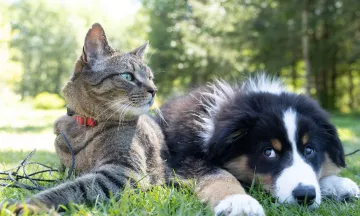What is toilet training?
Toilet training a puppy or older dog is about showing them appropriate places to eliminate. For most people, this means anywhere except indoors. However, some people might be more specific and want their dog to only pee and poop in a specific place, like on a puppy pee pad or a corner of the yard.

House training your puppy
Toilet training your puppy is about consistency, observation, patience, and lots of positive reinforcement. The aim is to set your puppy up for success. By giving them plenty of opportunity to do the right thing and rewarding them when they do, they are going to learn quickly.
Below is a guide on how to toilet train your puppy. The same also applies for an adult dog. The only difference is that with an adult dog, you may need a little more patience and understanding. Especially if they have been allowed to toilet inside for many years.
How long can a puppy go without needing to toilet?
As a general rule, a puppy can hold their bladder one hour for every month of age. So if your puppy is two months old, they can hold it for about two hours. Keep this in mind and proactively bring them out to the toilet and encourage them to relieve themselves.
Have a toilet training routine
Having a daily routine helps you and your puppy predict when they should be going to the toilet. Bring them out after every meal and each time after they awake from a nap. Once they relieve themselves, offer lots of praise and a treat. If your puppy tries to play with you before they go to the toilet, try to stay still to encourage them to sniff and relieve themselves first.

This teaches them that once they have done so, playtime can begin! In addition, try to limit or remove access to water a couple of hours before the puppy goes to bed. This reduces the chance of an accident overnight.
Observation and management
While your puppy is awake, keep an eye on them for signs that they need to go to the toilet. Sometimes puppies may not understand how to empty their whole bladder and may need to pee shortly after they just went outside. Or they may get over-excited while playing. Watch out for signs of circling and ground sniffing and immediately bring them outside and encourage them to relieve themselves.

While your puppy is still learning, limit their access to your home by placing them in a crate or enclosed playpen if you can't keep an eye on them. Allowing a puppy to have free reign of your house while you are not able to keep a close eye on them is not advisable. Not only can they destroy or ingest something, but if you are not watching for signs that they need to go to the toilet and proactively take them out, they may also learn that it's acceptable to toilet in the house.
How do you stop a pupping from peeing and pooping inside the house?
Accidents can happen and that is totally normal. If you catch your puppy in the act, don't make a fuss. Instead, calmly tell them 'no' or 'uh-uh' and if possible pick them up bring them outside immediately. If they finish up outside, make sure you offer lots of praise and treats to show them that that was the right thing to do.
If you only see the accident after, do not punish by rubbing their nose in it or say anything to your puppy. Simply clean it up with a dog pee stain and odour removal.
Dogs learn in the moment and not after the fact. So punishing them for something that has passed is not going to achieve anything. Instead, review your management plan and make an effort to take them out more frequently. The more times they eliminate in an appropriate place and get rewarded for it, the quicker they are going to learn.

If you are unable to be home all day to help your puppy through the toilet training phase, consider booking a dog sitter to visit your home during the day or send your puppy to a sitter who offers doggy daycare instead. Search for a pet sitter here.
How long does toilet training a puppy take?
It can take anywhere up to 6 months for a puppy to be toilet trained. Depending on the breed, it can also sometimes take up to a year. This does not mean that they can hold it for the whole day. Rather it means that they are able to hold it for a couple of hours or be able to indicate to you when they need to go outside. Remember to be patient during the toilet training phrase.
Most dogs will not intentionally want to eliminate where they live. While they are still young, a lot of their bowel muscles are still developing so help them as much as you can by setting them up for success.





